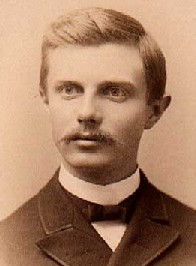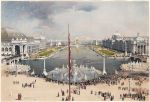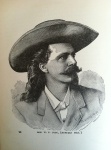
Frederick Jackson Turner
A few months ago, Amazon came up with one of its ‘suggested reading’ promotions that actually interested me. It was a book, obviously meant for students of history, called ‘Does the Frontier Experience Make America Exceptional?’ What an interesting question, I thought: does it?
Having travelled abroad fairly extensively since the late ’60s, I was aware that America means a lot of different things to different people. Sometimes one might get asked about New York and the Empire State Building; sometimes one might get a quip about Disneyland. There are, of course, more abstract ideas that represent America, Democracy being the most obvious. But the one pervasive idea about America early on, before the world became a place where news and photos were available instantly, was ‘Cowboys and Indians’. But do Cowboys and Indians a frontier make? Note that North America is the only area of the world where the word ‘frontier’ is used in the sense of a relatively uninhabited area that emigrants might homestead. The rest of the world simply employs the word to mean a border between countries.
The initial question as regards the frontier defining America was actually the idea of historian Frederick Jackson Turner, who gave a paper on this matter at the Chicago World’s Fair—the famous White City fair—of 1893.

Chicago World’s Fair, 1893
At the time, he was a thirty-one year old history professor from the University of Wisconsin, Madison, but he would go on through John Hopkins University and finally Harvard, having such an eminent career as an historian that his ideas are still discussed and debated today. However, back in 1893, as he gave his discourse to the American Historical Association, down the road Buffalo Bill’s Wild West and Congress of Rough Riders of the World was playing to packed audiences. The U.S. Census Bureau had declared the frontier “closed” in 1890 using their code of density of population. Here were two men representing that frontier in two very different ways. Turner’s idea of the frontier was empty land awaiting occupation in a relatively peaceful manner; it was also a moving line that had started in what we now consider the east and had slowly made its way to the Pacific. It was won with farming tools, such as the plow. Buffalo Bill represented the frontier as a constant battle to wrest lands from the hands of savage indigenous peoples with rifle and knife. In other words, Turner saw the frontier in terms of a defeat of Mother Nature; William Cody saw the frontier as a defeat of Native Americans. What they had in common, however, was that they both saw the frontier as the point where wilderness met civilization, and they both viewed America’s history in terms of the colonization of the ‘West’.
Turner wrote, “The United States lies like a huge page in the history of society” (pg. 23). His history of society went like this: “The buffalo trail became the Indian trail, and this…the trader’s “trace;” the trails widened into roads, and the roads into turnpikes, and these in turn were transformed into railroads…The trading posts…were on the sites of Indian villages…and these…have grown into…cities…” (pg. 25)  Buffalo Bill, on the other hand, saw this history as Indian hostility and white retaliation, neatly turning the vanquishers into victims. It’s interesting to note that his show included, at various times, Sitting Bull and other Sioux who had helped defeat Custer and who would later return to the Dakotas during the Ghost Dance troubles to fight once more. Similarly, Cody would serve as scout for the army during this period.
Buffalo Bill, on the other hand, saw this history as Indian hostility and white retaliation, neatly turning the vanquishers into victims. It’s interesting to note that his show included, at various times, Sitting Bull and other Sioux who had helped defeat Custer and who would later return to the Dakotas during the Ghost Dance troubles to fight once more. Similarly, Cody would serve as scout for the army during this period.
So, is America defined, then, by this one area of the country we call ‘The West’ and, if so, what constitutes that definition? For starters, there had to be an amount of independence in a people heading to settle an unknown wilderness; no longer was there the subordination of a lower, peasant class: they would be landowners. This, in turn, would raise not only a spirit of independence and self-reliance from their ability to manage the range and farmlands now at their disposal, but also a social interdependence from overcoming the obstacles of an arid landscape. The farmer, cowboy, sheepherder would become dependent on the inventor, the irrigator, and the engineer. In turn, according to Turner, a capitalist elite would arise. One has to keep in mind that the water empire is a purely western phenomenon; one-tenth of the world’s total of irrigated acres lie in the seventeen western states between the one-hundredth meridian and the Pacific, so it could certainly be considered a uniquely American venture. Finally, there is the West’s interaction with a federal government, possibly at times tinged with resentment yet still necessitating a give-and-take relationship. It was the government who instituted the Homestead Act, the Desert Land Act and so on, opening the frontier, while today ranchers and farmers must deal with such bodies as the Bureau of Land Management, not always happily. The federal government owns between .03% and 84.5% of land in all states, with the eleven westernmost states varying from 36.6% in CO to that 84.5% in NV.
Turner’s theory, of course, completely disregards a large swathe of what we consider American. It ignores Native Americans, women, and African Americans completely, as one might expect from a dissertation written in 1893. It disregards the culture, already existing at the time, of Hispanic peoples resident predominantly in the Southwest through to California. Miners of every ilk are neglected. Basically, it is an ethnocentric and bigoted view by today’s gauge. No mention is made of the traditions, cuisine, even native costume brought by the many and varied peoples who came across to populate the uninhabited frontier and thereby imparted such to our culture. Yet it remains that the frontier and the West loom large in our nation’s iconography. We must, therefore, be defined by it. And yet I must also ask, if we are defined by the West, then are westerners more ‘American’ than those of us descended from the immigrants who stopped on the east coast? Or are these traits common to us all?
Whether it is Larry McMurtry depicting the Old West or Kent Haruf depicting the New West, the American comes across as persistent, self-reliant, resilient, and indomitable—traits applicable to all Americans, one hopes, and a good mix of what both Turner and Cody saw in the frontier.
Does The Frontier Experience Make America Exceptional?, Etulain, Richard W., Ed., Bedford/St. Martin’s, New York, 1999 Quotes are taken from this edition.
Photo of Frederick Jackson Turner & World’s Fair poster, public domain. Photo of Buffalo Bill Cody taken from my own edition of Story of the Wild West and Camp-Fire Chats, Cody, W. F., Historical Publishing Company, Philadelphia, 1888
















Outstanding Andi! Thanks.
LikeLike
Thanks, Paul. That’s a great compliment coming from someone I admire! Much appreciated.
LikeLike
Hello, Andi and Happy New Year! As usual, you have written a very thoughtful blog and it made me think of my own family’s western movement. My mother’s family arrived with or just after the Mayflower and father’s wasn’t far behind. We were settled on the East Coast until the 1930’s and post WWII when a number of us came west to AZ and CA. Perhaps we are the New Westerners.
I also thought about Central and South America and realized I don’t know enough of their history to identify any “Western Movements” in Brazil, Argentina, Chile, etc. That might bear examination or commentary by someone better informed than I am.
Thanks for stimulating me to consider these questions….
LikeLike
I don’t know much history of South and Central America either, Arletta, but I do they have had waves of immigrants in certain countries, most notably Argentina which had a load of Italians to the point where their Spanish accent sounds almost Italian. Then, of course, a number of Germans went there as well and I believe Germans left Germany pre-1939 and settled in various countries. But, having said all that, I’m really asking about the frontier, that moving line into wilderness, forming a character we now consider American these days–someone resident in the USA as the term is generally accepted that way.
LikeLike
I enjoyed your thought-provoking post. Where Turner saw the subjugation of Mother Nature and Cody the people, I think Native Americans saw an attack on their physical, mental, and spiritual existence. Cody and Turner seem more alike than not in that way.
LikeLike
There’s no doubt that, as you point out, Native Americans were attacked in every possible way; I don’t believe, however, that either Turner or Cody gave a second thought to the spiritual and mental and lifestyle attack on Native Americans. Perhaps that’s what you’re saying? As Elliott West points out in his essay, ‘A Longer, Grimmer But More Interesting Story,’ part of the book noted below, pg. 123, “One wonders how the Nez Perce and Navajos survived the boredom of long centuries waiting for invaders from the East to show up.” In other words, considerations of the Native Americans in nineteenth century history revolve around their being a barrier to the frontier and virtually nothing more.
LikeLike
When I first studied the Turner thesis in college, I did not read it with a critical eye. Then I learned of the flaws critics see in Turner’s concepts. The frontiers of space, the ocean…indeed the frontier of cleaning up the mess humans have made of the earth…stopping Americans from shooting each other…the challenges are less romantic , perhaps, but they demand that age-old ‘American Spirit,’ now more than ever before.
LikeLike
There is a final chapter in the book, noted below, called, “Why the Past May be Changing”. As has been discussed several times on this website, most notably with posts by Paul Colt, views and interpretations of history change as time goes on. In some cases, it’s a matter of ‘fashion’ if you like; in others, it’s just new evidence coming to light. But the world is certainly a different place to what it was in 1893 so perhaps ‘flaws’ is not quite the right word to apply to Turner’s concepts?
LikeLiked by 1 person
Through your blog, I am learning a lot of interesting things. Thanks! Never was much of a history buff, but enjoy your info.
LikeLike
Well, that makes it all worthwhile! Thanks for saying that, Tena.
LikeLike
No matter the time or the place, humans have always seen the world through limitations of race, religion or any other way in which we deemed others as different. And generally, but not exclusively, we were not even aware that those who were “different” had personal wants or needs or even bled the same red blood. Indians were savage, whites were greedy, blacks were ignorant, etc. etc. It seems that those same ideas exist today, although in many cases, involving race and religion, on a lesser scale because of exposure to others on a broader scale. But now, for many, this broader scale is telling many that all Muslims are terrorists, and all gay people are immoral, and so on.
So back to the question, Does the Frontier Experience make America Exceptional? I don’t think so. Everyone struggled and battled forces of nature and each other at some period in history, it’s just that the American West got romanticized and came at a time when the masses were becoming more literate and books and movies spread the guts and the glory and bathed the masculine gender (white masculine gender) in white hats and silver bullets. I had to laugh about those poor old bored Nez Perce. They could have been more like their cousins, the Sioux and the Crow and fought each other oftener like other humans. That would have kept the boredom at bay. 🙂 Interesting post, Andrea.
LikeLike
There’s lots of food for thought in what you say, Eunie. It’s true that other countries battled forces of nature and each other at various times in their history, but their lands were already settled. I don’t think the formation of our ‘national character’ is only based on those battles, but on the fact that to create America–to have this continent if you like–those battles HAD to be fought. There was certainly no idea of “I shall fight no more forever” in the waves of white emigrants flowing across the continent.
LikeLike
It was interesting while doing genealogy to come across an early book about the new West–and it referred to Alabama.
Robyn Echols w/a Zina Abbott
LikeLike
I find that hilarious, Alabama being so ‘deep south’ but, yes, absolutely. The ‘west’ was once considered anything past the Alleghenies/Appalachians which, at the time, were difficult to pass. As Turner said, his frontier was a moving line so why not Alabama?
LikeLike
While doing research for my latest newspaper in education story about the Volga Germans, I thought their early history was pretty much like the settling of western America. . In 1763, Catherine the Great enticed many Germans, made destitute by wars and a mini-god rulers, to come to her country. The land she had for them to settle were vast grasslands in the Volga River region of Russia and many leaped at the chance. They were promised housing, horses, plows, but there was nothing there, but the land, land occupied by nomadic people who had always claimed the land as their own. Kind of like those who lived in the settled parts of America, going out west to take the land from the wild nomadic people who had claimed the land as their own for centuries. and like the Native American Indian, these nomadic people in Russia took umbrage and tried to drive them off, killing and kidnapping, but they had no place to go, and so those who survived finally took the land away from the nomadic tribes.
LikeLike
Well–and then they moved on to America bringing their characteristics with them! LOL But, yes, the traits I mention are not necessarily singular to Americans alone, but these traits don’t define Russia, which is where the Volga Germans immigrated to, they were specific to one area and one set of people within Russia, whereas what Turner says is that all the peoples who came to America and pushed the line of the frontier across the continent went into forming a national character. That is the difference.
LikeLike
Well, some of them moved to the Americas, North and South. They figured they’d better get the Hell out of Dodge and they were right. Eventually, those who stayed lost their freedoms, were sent to Siberia, starved to death or killed outright. The Irish, the Dutch, the Italians, the Pilgrims, etc. etc. all left for similar reasons and all changed America in some way. Even the Blacks brought over as slaves. America is too large, too diverse, with too many histories to be labeled by one area, even an area as vast as the west. Sorry, but I still don’t get it. Maybe my head is just too hard. We could probably carry this on for days and I still wouldn’t get. But I love you just the same. 🙂
LikeLiked by 1 person
We’ll crack open a bottle of Jack or whatever your tipple is when we’re next reunited and sort ALL of this out for sure! 😃
LikeLiked by 1 person
Sounds like great fun. 🙂
LikeLike
Great discussion, Andi and all. When we write about an era and diligently study that period, we’re often surprised by the complexity…our history books in school laid each period out so simply. But that’s what I like about the research we do with our writing. We purposefully write fiction; some historians do the same thing. Then there’s the whole ‘white perspective’ problem with history. Sigh! And our primary sources are dead! The Turner thesis made me think/rethink, as did Alexis de Tocqeville’s 1831 judgments on American democracy. To take a wide-angle view of America at any given time is tricky (especially if only whites are taking the pic), but I still learn from these portraits.
LikeLike
Well it would seem, then, that you’re in agreement with Eunie, and probably rightly so–I am taking Turner’s very wide-angle view. As for de Tocqueville, he really was something of a smartass skeptic, wasn’t he? I think of his “The American Republic will endure until the day Congress discovers that it can bribe the public with the public’s money.” Congress has been doing that for a very long time and we’re still here! Your comments, Rolynn, have been most welcome, as have Eunie’s.
LikeLiked by 1 person
This is such a broad-ranging topic, and you have an awesome discussion going on here, Andrea. The American West means so many different things to so many different people, as your discussion shows. Very, very interesting. I would say that there are pieces of truth in all the observations and that’s what makes the Old West so fascinating, it really encompasses so much. One of my most favorite movies, though somewhat shallow, compared to this discussion, is “How the West was Won.” I always thought that movie tried, to give wide-ranging slices of life in the American West when the various groups of pioneers were settling there.
LikeLike
Of course ‘How the West Was Won’ is guilty of its whiteness as are all the iconic films and books for the most part. I think of James Michener’s epic, ‘Centennial’ which takes a small area of CO through the ages from dinosaurs to the present, thru farmers, ranchers, merchants and so on, and not an African American among them as far as I can recall. What I do recall is that, in the tv series version, one character gets on a train to go home back east and says that it took him 6 months to get there in a wagon and now it’s 6 days in the train. In that respect, the West evolved more over the years during the same period than the East which was settled and ‘filled’ so much earlier, and had trains much earlier than the transcontinental RR. Keeping that in mind, perhaps the national character was already formed…
LikeLike
Your post made me think about the the “Western” persona. As a writer who was charmed by frontier stories from an early age, and went West to become a cowgirl, at the first opportunity, I feel that whites and other racial groups that settled the frontier, shared personality traits. They were willful, hardheaded, determined, adventure seekers, entrepreneurial, enterprising, and visionary. They had to be in order to survive. These are traits I see today in western women that ride horses, run boarding barns and ranches. I see it in way they raise their families, look you in the eye when they speak, and in their handshakes and hugs. There is a down to earth toughness about them that speaks to America’s original trailblazers. This particularly American character type is alive and well, depicted in stories written about the frontier era even today. I also see an appreciation of Native American history, spiritual awareness, and way of life, that was certainly not as apparent in bygone days (mainly due to the USA government’s violent land grabs, and the ensuing wars); although it did exist in pockets, even then. Great question.
LikeLike
When I head out to my place in Wyoming coming from the melting pot of New York, I’m always struck by how ‘white’ the west is. Of course, NYC makes a stark contrast to just about anywhere in the country, but even on my 7 week road trip this past summer, it struck my daughter and me that away from the cities–our trip included Nashville and Memphis and Charlotte–the west was very ‘white.’ When we visited Nicodemus, the Nat’l Pk in KS that is the settlement of freed slaves, it was like going onto an island, quite honestly. What you describe, the traits you mention, certainly give a true picture of the west I know, but I still wonder if it is representative today of ALL of America? Great input, Patrice, thanks so much!
LikeLike
What a wonderful discussion on the topic. The blog was so thoughtful and the responses have been thoughtful, as well. It’s all been–well–thought-provoking (to be repetitive.)
LikeLike
Well, I’m quite pleased with the responses…and thank you for yours!
LikeLike
I so love your history-filled blog posts. As a “westerner,” albeit transplanted from the Midwest, I see both the white American settler and the First Peoples pull on the area. And water rights are very sticky here. Early homesteaders and large ranchers fighting over water being diverted from the rivers for crops in an arid environment set the tone for the water laws that are in place today. Did you know, here in Colorado, that it is illegal to have a rain barrel attached to your gutter in your urban yard? And that you can’t just dig a pond on your property and let the rain fill it? You can go to jail! Land with water rights still intact are so rare as to be virtually non-existent. There is a piece of land I drive by every day on the way to work, it is 18 acres of scrub and rock and good for almost nothing, but it has its water rights intact, and is on the market for $1.9 MILLION. That’s insane.
LikeLike
Susabelle, thanks so much for that fascinating insight into water rights. As an easterner, I never even knew such a person as a water broker existed until my first visit to CO as an adult in the ’70s. The question of water in the west is a truly frightening one: they say the aquifer under the central area of the country including KS on down to part of TX will be gone in less than 25 years and then there’s the question of what they’re doing/trying to do with the Great Basin. Scary stuff. As someone who lived most of her life in the UK, the thought of it being illegal to put a rain barrel under the gutter downspout is absolutely amazing. I take it that’s because that water would go into the aquifer to which someone else has the rights?
LikeLike
That is exactly right, Andi. All water flows downhill. And it is being used faster than it can be replaced, mostly by agriculture that loves the fertile fields of eastern Colorado (but there is no water), and by increases in urbanization. Where I live is a fascinating hub of past water rights issues, which involved murders, taking of land, etc. The rich farmers won, of course, and to this day, still hold those rights.
LikeLike
WE partially have the invention of air conditioning to thank for this problem. Places such as AZ and NV & TX would never have developed to the extent they have without it. I’m currently reading Ivan Doig’s Dancing at the Rascal Fair which takes place in the early days of Montana’s settlement. Now, one would think MT with all those mountains and streams would have plenty of water, like one thinks of CO, but no. He describes the settlement of the dry lands and digging of personal reservoirs and so on. I don’t think I’ll be around to see what happens to this planet, or even the West, as regards this problem, but it certainly is coming. Well, in some respects, it’s here!
LikeLike
What an erudite and interesting blog post. Your raise some excellent and thought-provoking questions. I always cringe when I hear the term “manifest destiny” used. Each group seems to feel entitled to conquer the others. I love this blog and appreciate your research.
LikeLike
Thanks for that kind comment, Caroline; I appreciate it. I’m not entirely sure Jefferson saw ‘conquering’ as a part necessary to ‘manifest destiny’ IMHO, all he foresaw was that America would plow through to the other coast–like Turner, I believe he viewed it more as a conquest of nature and wilderness rather than peoples. Don’t forget that Lewis and Clark returned home safely having killed only two men and having been led by Sacagawea.
LikeLike
I think the impact of the frontier was to impart a sense of opportunity and potential on the American character. From the 1600s the West absorbed Europeans looking for something better. Racism was holy writ so displacing indigenous peoples was not an ethical problem. When the towns grew to cities this sense of possibility continued. The popular culture embraced the stories of Daniel Boone. The US Government made settlement by individual farmers national policy.
The Civil War found its roots in slavery, not so much the practice of slavery in the South, but the expansion of slavery West.
As pointed out above, Europeans, particularly Russians, had their own frontier sagas, but these generally were opportunities for nobles to build fiefdoms on the backs of peasants who often spoke a different language.
LikeLike
David, thanks so much for that very clear and concise input. Your words are an excellent summation to what was behind Turner’s lack of concern for native Americans, and it is so true that the question of expansion of slavery into the west was indeed ignition for the Civil War, as witnessed by KS vs MO and so on.
LikeLike